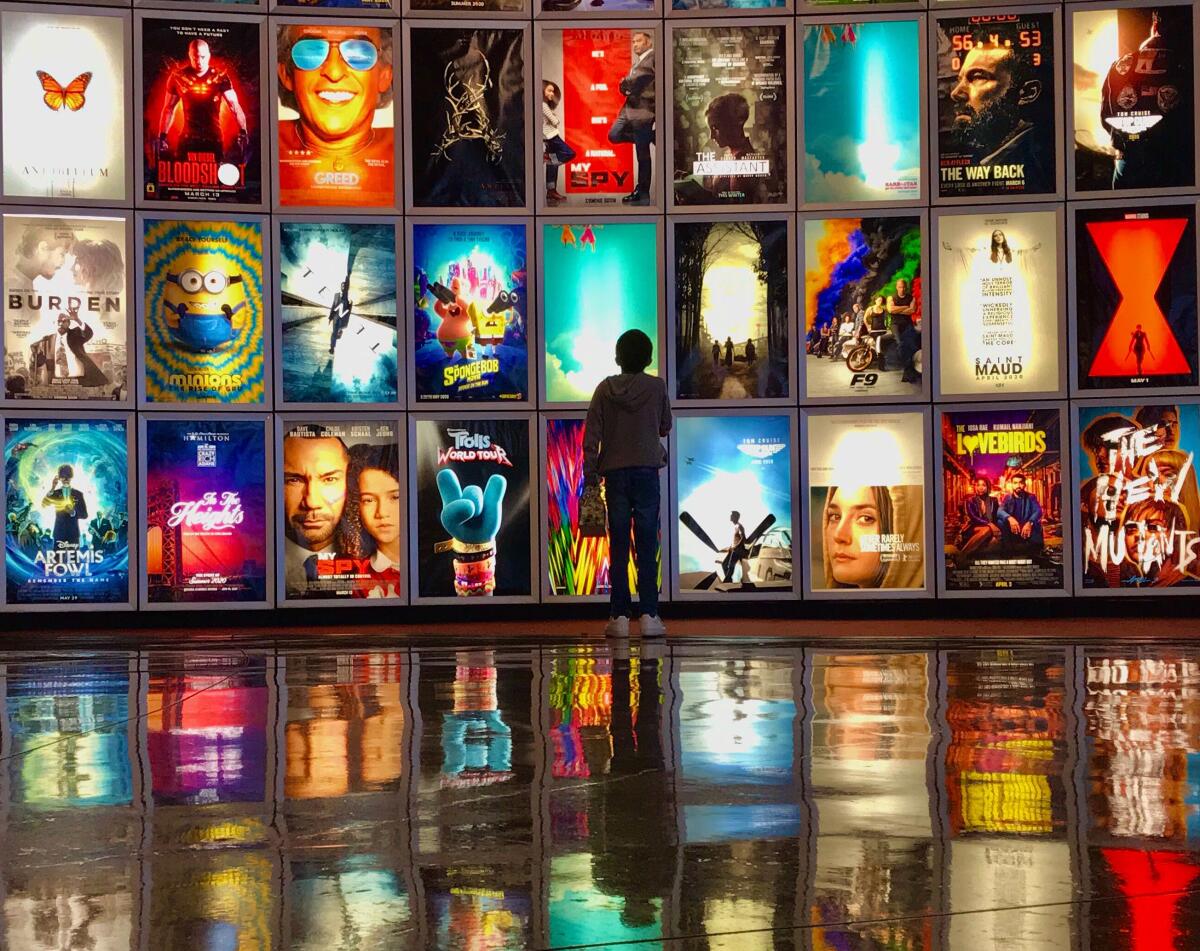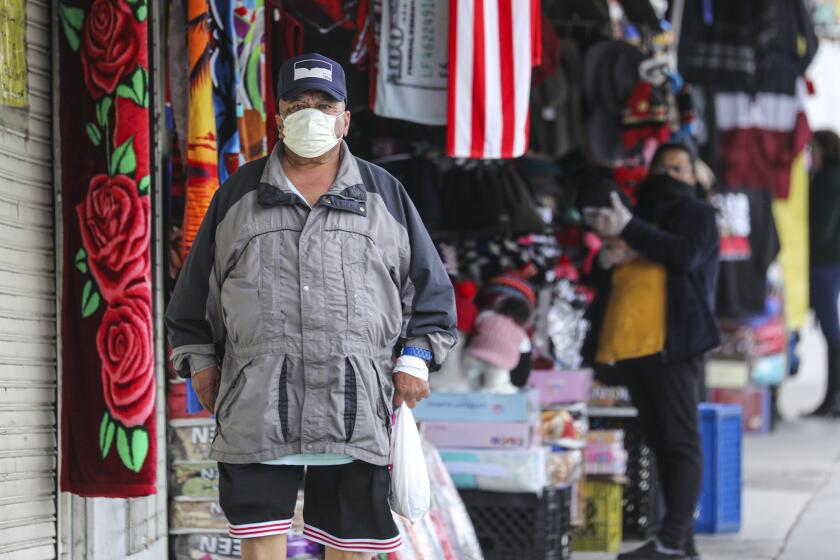The coronavirus crisis got very real for Hollywood this week

For weeks, it’s been clear that the growing coronavirus crisis would have significant effect on Hollywood, due to closed theaters in China and nervous customers around the world.
This week, though, the situation got very real for the entertainment industry, which relies heavily on live events and group experiences.
Media and entertainment stocks — including Walt Disney Co. and AMC Entertainment — were hammered Thursday, along with the rest of the market, reflecting deepening investor fears about the financial impact of the virus.
Get the latest coronavirus updates from our staff in California and around the world.
Hollywood studios scrambled to push back release dates for potential blockbusters including Disney’s “Mulan,” Paramount Pictures’ “A Quiet Place Part II” and Universal Pictures’ “F9,” the latest in the “Fast and the Furious” saga. The new “Fast” movie has been delayed by nearly a year.
CBS, NBCUniversal, Fox and other TV networks separately canceled their advertiser presentations in New York in May. The lavish events, which draw thousands of advertisers, kick off the all-important upfront sales market, when advertisers make commitments for nearly $20 billion in ad time for the upcoming TV season.
The day before, the National Assn. of Theatre Owners canceled CinemaCon, its annual gathering of studios and exhibitors that was supposed to start March 30 in Las Vegas.
The decisions reflect the seriousness of the situation for theaters at a time when many government officials are discouraging people from mass gathering in close proximity with one another. Cinema’s key weapon against the threat of streaming, video games and peak TV, after all, is the appeal of the communal experience of audiences in theaters.
“It is with great regret we are announcing the cancellation of CinemaCon 2020,” said the theater owner group’s chief executive, John Fithian, and CinemaCon’s managing director, Mitch Neuhauser, in a note to attendees. “While local outbreaks vary widely in severity, the global circumstances make it impossible for us to mount the show that our attendees have come to expect.”
The event’s organizers had been hoping to continue the show with additional safety precautions at Caesars Palace, including extra trash bins and hand sanitizing stations. The group had insisted the show would go on even as events such as South by Southwest were canceled and the Coachella Valley Music and Arts Festival was moved to October.
But that was before a flurry of announcements by government officials and companies this week.
California officials called for the cancellation of all gatherings of 250 or more people to slow the spread of the coronavirus, a decision that came hours after the suspension of the NBA season. President Trump on Wednesday night suspended travel from Europe as the novel coronavirus continued its spread across the globe.
Perhaps most jarring for the entertainment industry, Oscar-winning actor Tom Hanks disclosed that he and his wife, Rita Wilson, had tested positive for COVID-19 while in Australia to make a movie. Hanks is featured in Warner Bros.’ music biopic “Elvis,” which was in preproduction in the country.
“Well, now. What to do next?” Hanks said in a statement. “The Medical Officials have protocols that must be followed. We Hanks’ will be tested, observed, and isolated for as long as public health and safety requires. Not much more to it than a one-day-at-a-time approach, no? We’ll keep the world posted and updated. Take care of yourselves!”
Analysts are still trying to reckon with the size and scope of the problem for media and entertainment companies, which are already grappling with existential issues such as falling theatrical attendance and declining TV ratings amid the rise of streaming.
“Given the broad exposure the media and advertising industry has to live entertainment (sports, film exhibition, theme parks, concerts, event marketing), the likelihood of continuing closures will bring unprecedented harm to these companies at a most fragile time,” prominent media analyst Michael Nathanson wrote in a blog post for clients. “We are in the process of determining the full extent of the damage.”
Fear of the pandemic was reflected on Wall Street.
Shares of AMC Entertainment, owner of the world’s largest cinema circuit, dropped 72 cents, or 20%, to $2.91 in Thursday trading. The stock has lost 60% of its value this year. Although theaters in countries including China and Italy have been closed, it is not yet clear whether the situation will result in any similar dire actions in the U.S.
ViacomCBS’ stock dropped 18% to $16.14 . The company’s Los Angeles movie studio Paramount Pictures on Thursday delayed the release of its horror sequel “A Quiet Place Part II.” The studio has not set a new release date, which was previously set for March 20. Paramount also pulled the release of the romantic comedy “The Lovebirds,” originally planned for April 3.
“One of the things I’m most proud of is that people have said our movie is one you have to see all together,” director John Krasinski wrote in a tweeted statement. “Well due to ever-changing circumstances of what’s going on in the world around us, now is clearly not the right time to do that.”
ViacomCBS also announced Thursday that it would scrap its annual extravaganza for advertisers during the so-called upfront week in May. For decades, CBS and the other networks have wooed advertisers in elaborate and star-studded presentations in New York. CBS has long held court at the stately Carnegie Hall.
“We’ll miss Carnegie Hall and our agency dinners this year, but the health and safety of our clients and the ViacomCBS team comes first,” said Jo Ann Ross, president and chief advertising revenue officer for ViacomCBS Domestic Advertising Sales.
Comcast Corp.’s NBCUniversal also canceled its live upfront event.
For Universal Pictures, also owned by the Philadelphia cable giant, the delay of the the new “Fast & Furious” is a major blow. The film will be pushed back nearly a year from May 22 to April 2, 2021. The action series is one of Universal’s key franchises, with much of its business driven by international ticket sales, especially in China.
Comcast’s stock fell $2.97, or 8%, to $34.94.
The suspension of the NBA schedule is expected to hit multiple media giants that broadcast the games, including Disney’s ESPN and AT&T’s WarnerMedia, which shows pro basketball on its Turner networks. AT&T’s stock declined $3.19, or 9%, to $31.33
One of the most anticipated film releases was Disney’s “Mulan,” a live-action remake of the 1998 animated musical based on a Chinese legend. “Mulan” was expected to debut March 27, and was banking on a major release in China.
A Disney spokesman on Thursday said the company was postponing the release of “Mulan” and two other movies “out of an abundance of caution.” Disney has not determined a new date for “Mulan.” The studio has also delayed the 20th Century Studios superhero film “The New Mutants” and Searchlight Pictures’ horror movie “Antlers” until further notice.
Plans for “Black Widow,” the Marvel movie starring Scarlett Johansson, have not yet changed.
“Disney’s studio stands to be one of the most impacted with six major films set to be released before July,” said Robert Fishman of the Moffett Nathanson research firm.
.
Disney has been hard-hit by the virus, especially in Asia, where theme parks have been shuttered for weeks. The Burbank-based entertainment giant on Thursday said it would close Disneyland Park and Disney California Adventure, beginning the morning of March 14 through the end of the month.
On Thursday, Disney shares sank 13% to $91.81 a share — a level that the stock hasn’t traded at since 2016. The stock is down 38% since late November, when Wall Street was cheering the company’s strong launch of its Disney+ streaming service.
But those gains have been erased. In recent weeks, shares have been reeling from investor worries about theme park closures and box office impact.
At Disney’s annual shareholder meeting Wednesday in Raleigh, N.C., Executive Chairman Bob Iger acknowledged the threat of the coronavirus situation.
“It’s fair to say we’re all sobered by the concern that we feel for everyone affected by this global crisis,” Iger said in prepared remarks. “These are challenging times for everyone.”
More to Read
Inside the business of entertainment
The Wide Shot brings you news, analysis and insights on everything from streaming wars to production — and what it all means for the future.
You may occasionally receive promotional content from the Los Angeles Times.













